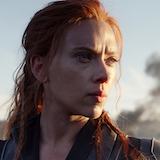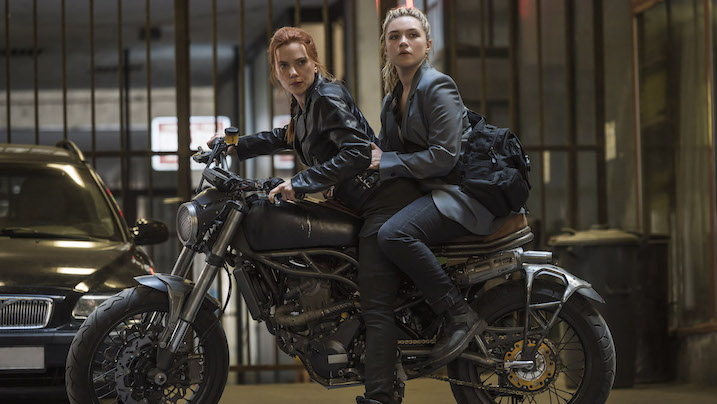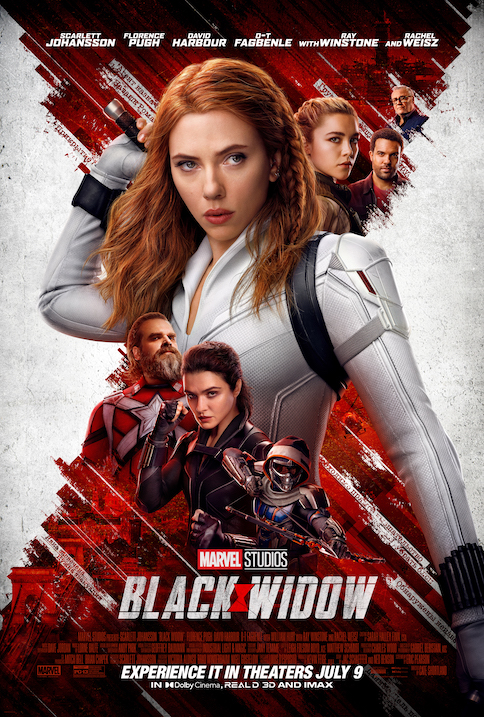‘Black Widow’ Leaps Over Most MCU Solo Flicks (Movie Review)

One of the original members of the Avengers Initiative finally gets her close-up. Black Widow, the 24th entry in the ginormous Marvel phenomenon, releases on July 9th in theaters and as Premiere-Access on Disney Plus for $29.99. This is the first film in the MCU’s Phase 4, even though Spider-Man: Far From Home was way back in July 2019. COVID clearly played a factor, but regardless I wasn’t too excited to see what looked to be, via the trailers, a big flashback episode so quickly in the aftermath of wrapping up the arcs of Steve, Tony, and definitely Natasha. And yet, since it had been a minute thanks to that pandemic (even with those D+ shows like WandaVision to keep me occupied), I couldn’t wait to see the Marvel Studios logo once again light up the big screen. Will the second female-led MCU film be vaulted into the heights of the best solo adventures like Captain America: The Winter Soldier or be quickly be forgotten like The Incredible Hulk?

Although I’ve yet to take a survey among fans, I’ve always assumed the favorite films of the MCU feature the most superheroes. (Yes, Black Panther and Guardians of the Galaxy rock despite the lack of an all-star Avengers team-up.) The solo installments tend to garner less excitement from yours truly. Back in the day, wading through the latest Thor sequel was the veggies to the delicious entree that was Avengers: Age of Ultron.
Having said that, Cap’s second venture to the big screen, The Winter Soldier, is just as good as any giant-sized Avengers outing. It has tight pacing, a cool Cold War vibe, and although it does include a few of those All-Star players, it’s Steve Rogers’ internal conflict (to balance duty with morality) that made it one of the best MCU films.
As an early fan of Natasha Romanoff (Scarlett Johansson) back when we thought she was “Natalie Rushman” (Iron Man 2), I had been eager to see a full-fledged story focused on her. I liked the similarities between both Steve Rogers and Romanoff. Both characters have that East versus West thing in their DNA. Both focus on their respective nation’s version of a super-soldier. Plus, the films are excellently cast (and it’s no secret Johansson is the stronger actor of the two). So, it’s with great relief that Black Widow not only met my expectations but exceeded them. This might just be the best solo MCU since Steve alerted Sam that he was on his left.

I know it’s a loaded suggestion to proclaim Black Widow with such high regard as I’ve only seen it once, but I feel confident in my assessment. Director Cate Shortland (Lore) keeps those 134 minutes running smoothly. Largely taking place between the events of Captain America: Civil War and Avengers: Infinity War, it’s a tale that’s fast, furious, and focused on family. Only a few weeks after Dominic Toretto’s ninth Fast & Furious entry upped the ante with flashbacks and a retconned sibling, Black Widow makes these same plot mechanics work even better.
A short flashback opening introduces us to a fake Russian family unit posing as a U.S. family (giving off strong vibes of FX’s The Americans). Two little girls, a buff dad (David Harbour), and a shoot-to-kill mama (Rachel Weisz ) live a suburban life in Ohio until they’re abruptly found out. Years later, Natasha (Scarlett Johanson) gets an unlikely message, and soon enough we’re hanging out with scene-stealer Florence Pugh as younger sister Yelena. From there, it’s covert ops, family secrets, and an unstoppable assassin known as the Taskmaster, who can mimic any adversary.
The script by Erica Pearson, Jac Schaeffer, and Ned Benson assumes audiences are familiar with Russian spy tropes (think Salt or Red Sparrow). In any case, if you’ve seen the MCU films, you know Natasha was in a program that took young girls, sterilized them, and created perfect assassins. The hook in Black Widow is that while that kind of demented recruitment made Natasha a killer, it also gave her a family…of sorts. While the film does feature plenty of globetrotting action, like a thrilling motorcycle chase with the Romanoff siblings, it’s the dynamic between Natasha, Yelena, and their “parents” that makes the film soar. Sometimes, literally high above the clouds.

The weaker features of the early MCU solo films had a reliance on a single baddie that is the doppelgänger of the hero (Think Jeff Bridges’ forgettable character in the first Iron Man). This time, the main villain is less an evil twin and more a Bond villain, complete with solid monologuing. Ray Winstone hams it up enough as former Soviet mastermind Dreykov.
The 007 movies are clearly an inspiration. Early on, there’s a scene with Natasha watching Moonraker in her trailer, and the big climax is a modern update on Roger Moore’s outing from the 70s. Even the aforementioned Taskmaster has an arc resembling the story of Jaws (Not the shark). These kinds of tweaks feel like a natural evolution of the solo films from the past decade.
Johansson is terrific. I assume she’s been waiting to finally dive deeper into a character she’s been playing since 2010. She’s able to suggest a lot with just gestures and other non-verbal cues. At the same time, witnessing Natasha gain the upper hand via dialogue is the kind of banter Johansson excels at. It’s truly a Natasha specialty, most famously used in her confrontation with Loki in the first Avengers. Here though, there’s an added layer of being in her headspace.

Like Steve Rogers, Natasha has an internal conflict that perfectly suits her own outing. She’s both literally and figuratively trying to balance her loyalty to what she sees as just versus how such actions may affect the multiple families she’s made in her life. It’s a tribute to Johansson’s performance that several times I wasn’t quite sure how the Academy Award-nominated actor would play such a scene. And fortunately, she’s got a more than able cast to bounce (or kick and shoot) off of.
Harbour and Pugh do good work here, too, playing up the mannerisms of both Russian and American. Like the best MCU entries, there’s plenty of humor throughout. Some of the visual gags are obvious, like papa Alexei (Harbour) trying to fit into his Red Guardian super-suit a la Mr. Incredible; while other moments allow the actors to loosen up with some of the clever exchanges like Yelena’s (Pugh) meta moment where she takes Natasha to task about her superhero pose. It’s hilarious.

This isn’t to say the big set pieces aren’t engaging. No one will ever mistake a motorcycle chase or a hand-to-hand exchange as anything on the level of Mission Impossible, but the action “gets the job done.” And, like the bulk of the film, even these scenes are helped out immensely by the chemistry of the cast.
Black Widow stands as Marvel’s best solo-hero character tale since The Winter Soldier. It might lack the huge canvas of Wakanda or the galaxy-spanning exploits of Thanos in Infinity War, but the heart of this picture is in the right place. Sadly, after appearing up in no less than eight MCU movies, Natasha Romanoff has left the building. If this the only film we’ll ever get with her as the star, I can at least look forward to multiple viewings.
(Heads up! Stay for the credits as there is a single post-credits scene.)
![]()
![]()
![]()
![]()
![]()


















